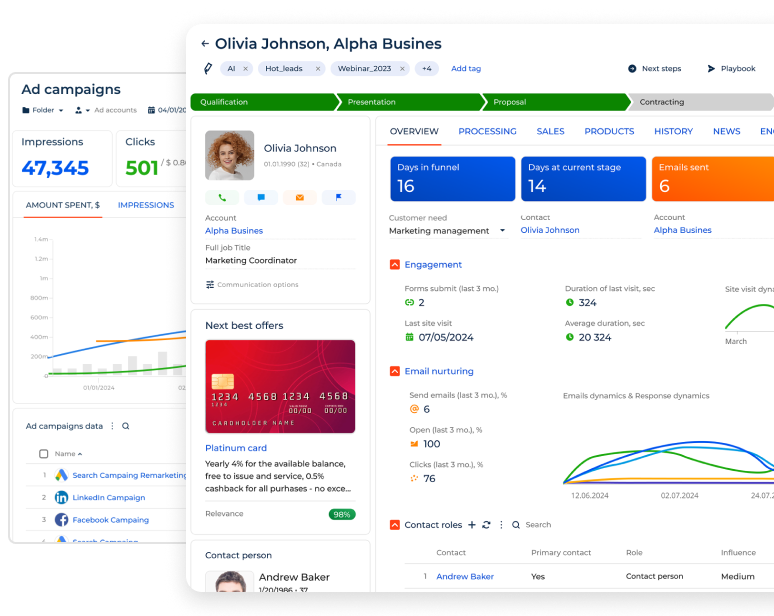-
No-Code
Platform
-
Studio
No-code agentic platform delivering the fastest time-to-value and the highest ROI
-
Studio
-
AI-Native CRM
CRM
-
AI-Native CRM
New era CRM to manage customer & operational workflows
CRM Products -
AI-Native CRM
- Industries
- Customers
- Partners
- About
The Ultimate Guide to Healthcare CRM & Top-5 CRM Systems for Healthcare
Updated on
October 30, 2025
15 min read
Enhance Healthcare Ops with Creatio’s Agentic CRM

The healthcare software market is expanding rapidly, driven by the growing adoption of cloud-based solutions across hospitals, clinics, and insurance companies. According to Grand View Research, the market size is projected to reach $74.74 billion by 2030 — nearly triple its value in 2024.
As demand for efficient, personalized medical services rises, more healthcare organizations are turning to specialized software to enhance operations and improve service quality. One of the most effective solutions is the healthcare CRM — a platform designed to manage patient relationships, streamline operations, and strengthen collaboration across the care network.
In this guide, we’ll cover everything you need to know about healthcare CRM systems — what they are, the key benefits they offer, and the top CRM solutions worth considering for healthcare and medical institutions.
Key Takeaways:
- Healthcare CRM refers to CRM systems that are specifically tailored for the medical sector, helping organizations manage patient information, track interactions, and automate workflows across departments — all while maintaining compliance with industry regulations.
- Healthcare CRMs are commonly adopted by hospitals, outpatient clinics, insurance providers, telehealth companies, and other healthcare organizations looking to improve efficiency and patient experience.
- The most impactful benefits of healthcare CRM systems include stronger patient engagement, process automation, enhanced compliance, data-driven decision-making, and better coordination across teams.
- The top healthcare CRM vendors for 2026 include Creatio, Microsoft, Zoho, Salesforce, and LeadSquared.
What is a Healthcare CRM?
A healthcare CRM (Customer Relationship Management) system is a digital platform that helps healthcare organizations manage patient information, track interactions and streamline administrative workflows across the key departments. Unlike generic CRM software, a healthcare CRM is purpose-built for the medical sector — enabling providers to improve data accuracy, optimize administrative operations, and deliver more personalized patient care while maintaining full regulatory compliance.
Healthcare CRM software typically integrates with core systems such as electronic health records (EHRs), billing platforms, and communication tools, providing clinical and administrative teams with a unified, real-time data view, ensuring seamless communication and coordination across departments. Modern CRM solutions also use artificial intelligence (AI) and automation to analyze patient information, recommend relevant treatments or services, and streamline repetitive tasks such as appointment scheduling, reminders, confirmations, and follow-ups.
These fundamental CRM capabilities help medical institutions strengthen patient relationships, reduce operational inefficiencies, and build a solid foundation for smarter, AI-driven care delivery.
Who Needs Healthcare CRM Systems?
CRM is a universal solution for medical institutions that aim to streamline various administrative and patient-facing workflows. Below are examples of healthcare organizations and the areas where they find the CRM system most valuable:
Organization | CRM Use Cases |
| Hospital Systems and Large Healthcare Networks | Centralize sensitive patient data across facilities, track referrals, and automate appointment management and post-discharge follow-ups to ensure coordinated care |
| Ambulatory and Outpatient Clinics | Manage patient scheduling, automate visit reminders, and deliver personalized care recommendations after each visit |
| Payers, Insurance Providers, and Health Plans | Track member interactions, streamline claim management, and improve engagement through tailored care and wellness programs |
| Pharma and Life Sciences Organizations | Manage communications and relationships with healthcare providers, track outreach campaigns, and support commercial and field operations |
| Telehealth and Remote Care Providers | Integrate patient data from virtual visits, automate follow-ups, and maintain consistent, omnichannel care experiences for chronic disease management |
| Community and Population Health Programs | Monitor outreach campaigns, identify high-risk groups, and coordinate interventions that improve community health outcomes at scale |
Beyond the standard use cases, each organization can customize its CRM to the unique business needs while ensuring ongoing compliance with healthcare regulations.
Benefits of CRM for Healthcare Companies
In the era of digital transformation, healthcare CRMs enable organizations to deliver more personalized, value-driven care that enhances performance and improves business growth. Here are the most notable benefits of CRM systems in healthcare to know about:
#1. Improved Patient Engagement and Experience
Healthcare CRM centralizes patient data and communication channels, helping providers better understand patient needs and preferences. This minimizes time spent on manual processes and increases operational efficiency, allowing teams to deliver more personalized care and build stronger relationships.
By setting up automated reminders, follow-ups, and targeted campaigns through the CRM, healthcare providers can maintain consistent engagement and strengthen patient loyalty. For example, clinics often send automated SMS reminders 24–48 hours before appointments that help reduce last-minute cancellations and no-shows.
#2. Automated Processes and Operational Efficiency
A healthcare CRM automates repetitive administrative workflows, helping organizations optimize day-to-day operations and reduce manual workload. Tasks such as patient registration, appointment scheduling, billing, and data entry can be fully or partially automated, minimizing errors and improving staff productivity. As a result, medical staff can focus more on patients rather than admin tasks and deliver more genuine, attentive care to every individual.
#3. Enhanced Regulatory Compliance and Data Security
In regulated industries like healthcare, meeting standards like HIPAA, GDPR, or HITECH is essential. Healthcare CRM helps protect sensitive patient information and internal data by encrypting data, controlling access, and tracking user activity in real-time. As an example, users can check CRM’s access logs to uncover who viewed patient records or updated data, ensuring full transparency during compliance audits.
#4. Data-Driven Decision Making and Predictive Insights
A healthcare CRM provides a centralized view of clinical, operational, and financial data, helping medical and administrative teams make faster, better-informed decisions. Moreover, with its built-in analytics and AI tools, doctors can easily review medical records, summarize treatment progress, and project outcomes to deliver more personalized care. For medical staff, AI can assist in analyzing the stock of essential materials, drafting orders of supplies, and forecasting shortages. Managers and executives use AI-powered analytics to analyze revenue trends, service demand, and departmental performance, which allows for smarter resource planning and operational efficiency.
For example, Guided Care, a business unit of Focal Point Care, implemented Creatio CRM to create a single, connected view of every customer touchpoint across sales, service, and care delivery. This allowed teams to meet with clients fully informed, anticipate needs, and proactively identify opportunities to enhance service. The company also leverages Creatio’s AI tools to process unstructured documents, extract critical data, and automate workflows that were previously manual and time-intensive.
#5. Better Coordination Across Teams and Departments
With shared access to real-time patient data, communication history, and care plans, healthcare staff stay aligned across various patient-facing and back-office operations. This is especially important for large organizations that manage multiple departments, facilities, or care units and need consistent communication across all of them.
For example, doctors can instantly review a patient’s medical history and treatment updates, while administrators can track appointment status and manage follow-ups within a unified platform. By keeping everyone connected and updated, healthcare organizations can deliver faster service, reduce handoff errors, and build stronger, long-term relationships with their patients.
10 Essential Features of Healthcare CRM Systems
Modern CRM platforms come packed with an extensive range of features and capabilities, which makes the selection process really overwhelming. Below are those that work particularly well for healthcare organizations, helping them enhance patient relationships, streamline operations, and deliver higher-quality care:
- 360° Patient Data Management: Consolidates all patient information (demographics, medical history, interactions, communication records, etc.) into a single, unified profile accessible to authorized staff across departments.
- Smart Appointment Scheduling: Enables patients to easily manage their appointments online, view real-time availability, book visits, and receive automated reminders or follow-ups.
- Integrations with EHR/EMR and Third-Party Systems: Connects seamlessly with electronic health records (EHR) systems, billing systems, and payment platforms to synchronize data and streamline financial transactions, invoicing, and claims management.
- Patient Self-Service Portals: Provides patients with secure online access to view their medical records, lab results, and treatment plans — and communicate directly with care teams. This transparency improves patient engagement and trust.
- Document Management: Offers a secure, centralized repository for storing medical and administrative documents, allowing authorized users to access data in real time, ensure consistent recordkeeping and faster retrieval of patient information.
- AI-Powered Automation and Predictive Analytics: Leverages AI tools and agents to analyze patient and operational data, spot trends and identify care gaps, forecast demand, and support proactive, data-driven decision-making across the organization. The AI capabilities of CRM enable deeper automation of the routine processes and day-to-day operations, such as follow-ups, task assignments, and patient data updates.
- Omnichannel Communication Management: Unifies communication channels such as email, SMS, chat, and phone into one platform, ensuring consistent messaging and timely follow-ups across all points of contact.
- Marketing and Patient Outreach Tools: Enables marketing teams to design tailored campaigns, segment target audiences, and automate engagement programs to attract new patients and engage the existing client base.
- Customizable Dashboards and Reporting: Allows users to build custom dashboards and reports to track key performance metrics (i.e., satisfaction rates, frequently used care services, patient no-shows, etc.) that benefit strategic planning.
- Mobile Accessibility: Gives healthcare professionals seamless yet secure access to data on the go via mobile devices, which enables timely updates, communication, and decision-making from any location.
These essential CRM capabilities help healthcare institutions improve patient management, enhance efficiency, and deliver value-driven care across each and every department.
5 Best CRM for Healthcare in 2026: Overview
CRM Provider | Pricing | G2 Rating |
| Creatio CRM | Starting at $40 per user/month (for the No-code agentic platform + CRM products) | 4.7 |
| Microsoft Dynamics 365 | Starting at $105 per user/month | 3.8 |
| Zoho CRM | Starting at $50 per user/month (for the Enterprise plan) | 4.1 |
| Salesforce | Starting at $100+ per user/month (for the Enterprise CRM plan) and from $350 for Salesforce Health Cloud | 4.4 |
| HubSpot | Starting at $50–75 per user/month (CRM Professional / CRM Enterprise plans) | 4.4 |
Creatio CRM
Best for: Midsize to large healthcare organizations seeking a fully customizable, agentic CRM platform to manage end-to-end patient and operational workflows.
Creatio CRM is a new era CRM to manage all customer and operational workflows with no-code and AI at its core. It offers a unified CRM suite for service, sales, and marketing automation, along with industry-specific solutions for 20+ sectors, including healthcare. Healthcare providers use Creatio CRM to automate and personalize the entire patient journey, streamline relationship management, and boost productivity across medical and administrative teams. Its composable no-code architecture allows enterprises to adapt workflows, interfaces, and processes to their unique needs without requiring deep IT involvement.
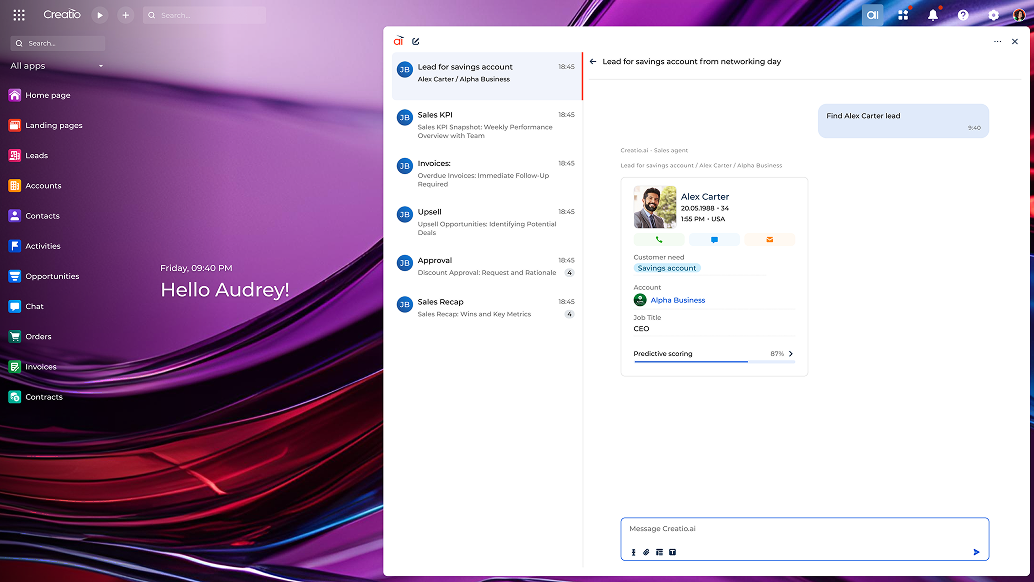
Creatio CRM stands out for its AI-native foundation, which makes all data objects, relationships, and workflows accessible for intelligent automation. Its agentic AI capabilities enable users to perform tasks, generate insights, and automate processes through a single conversational interface. Healthcare organizations can create role-specific AI agents or customize Creatio’s OOTB agents to handle tasks like patient data entry, scheduling, or billing follow-ups, significantly improving efficiency.
Creatio CRM also provides built-in GDPR and HIPAA compliance guardrails, enterprise-grade security, and scalable governance. Thanks to its no-code integration framework, the platform connects seamlessly with external AI tools and specialized software, enabling continuous innovation without disrupting existing workflows. This flexibility allows healthcare institutions to evolve and scale their operations while maintaining a consistent, high-performing system.
Standout Features:
- Agentic CRM and healthcare automation solutions to enhance patient experience, streamline and optimize internal workflows.
- Customizable CRM Agents to automate routine tasks and processes, scale operations, and accelerate time-to-value.
- Comprehensive patient management system to centralize patient data, communication, and care coordination.
- Self-service patient portals that allow patients to access their records, book appointments, and communicate with care providers online.
- Advanced document management and automation to securely store, organize, and process clinical and administrative data.
- Real-time analytics and reporting to monitor performance, track outcomes, and support data-driven decision-making.
- Seamless embedding of AI tools and agents into productivity apps like Microsoft Outlook and Microsoft Teams to drive collaboration and efficiency.
- Over 400 applications and third-party add-ons available through Creatio Marketplace to further extend the platform’s capabilities.
Pricing:
Creatio offers a composable pricing model that allows organizations to pay only for the products they use. The core platform includes several plans ranging from $25 to $85 per user/month, each coming with integrated AI capabilities. The CRM products — Sales, Marketing, and Service — are priced at $15 per user/month and can be purchased either as a unified CRM bundle or as standalone solutions, giving healthcare organizations the flexibility to configure the platform according to their specific needs.
Microsoft Dynamics 365
Best for: Large healthcare enterprises seeking strong integration with Microsoft’s productivity and cloud ecosystem.
Microsoft Dynamics 365 provides a comprehensive suite of CRM and ERP tools that connect patient management, care coordination, and operational workflows within a unified ecosystem. Through native integrations with Microsoft Power Platform, Azure, Teams, and Outlook, healthcare organizations can design tailored solutions to engage patients, coordinate care, and collaborate efficiently across the Microsoft environment.
The platform enables providers to deliver personalized care, monitor patients remotely, and use data insights to improve care quality and team performance. Dynamics 365 also supports HIPAA compliance, role-based access controls, and advanced analytics that help organizations expand their healthcare capabilities for more personalized and effective care delivery.
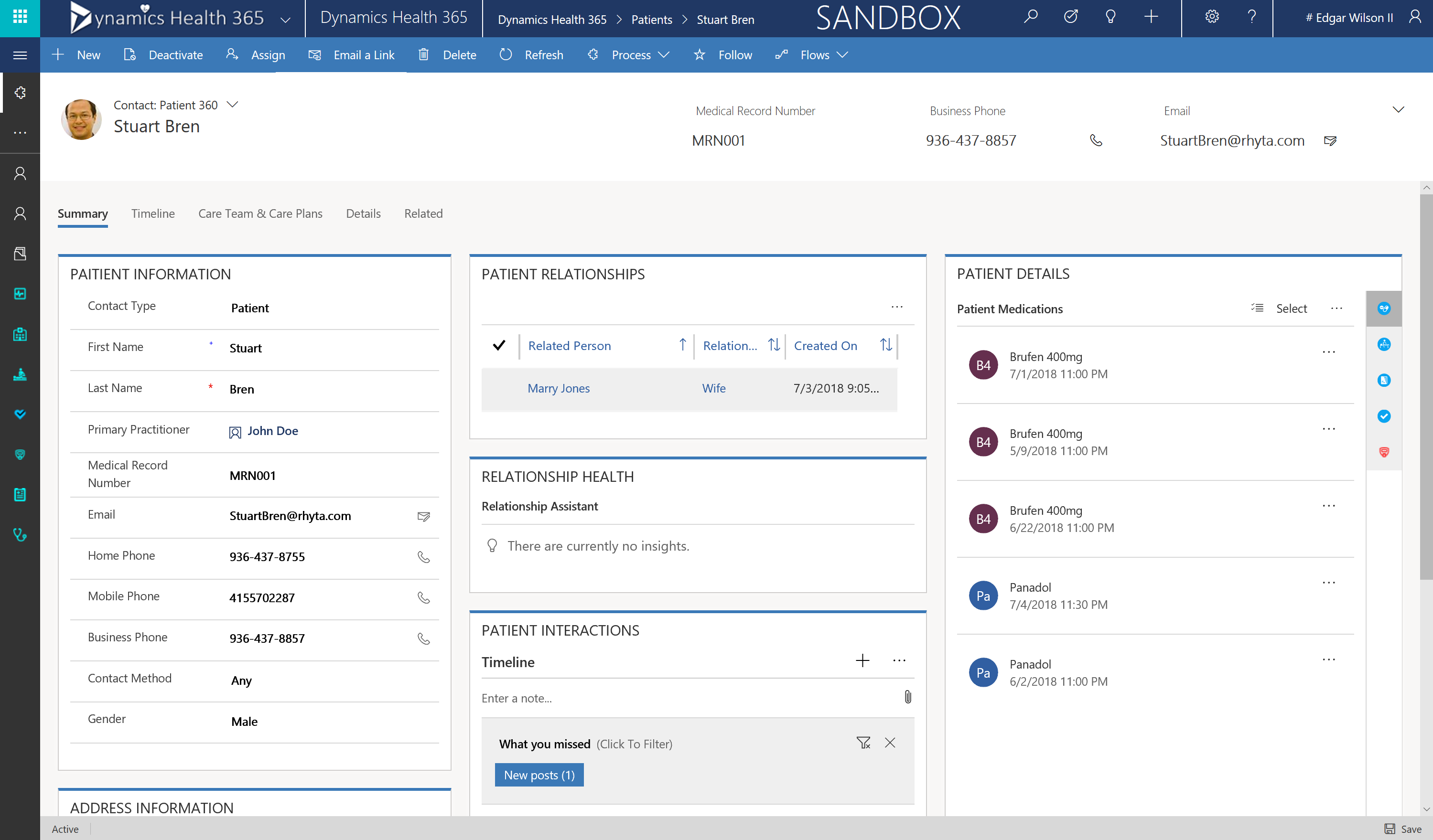
Standout Features:
- Unified patient view that consolidates patient data for faster analysis and more coordinated treatment planning.
- Care coordination and collaboration tools that enable care teams to create, personalize, and manage patient care plans within a shared workspace.
- Operational and clinical analytics that leverage predictive modeling to identify trends and generate actionable insights across facilities.
- Pre-built team templates that help healthcare staff quickly organize collaboration spaces for patient care or administrative tasks.
- Integrated communication through Microsoft Teams to enhance coordination between clinical and operational teams.
Note: Some features require additional licenses for Microsoft Cloud for Healthcare, Azure, Power Platform, or Teams.
Pricing:
The Dynamics 365 pricing starts at $105 per user/month (for Field Service app). Healthcare solutions powered by Dynamics 365 and Power Platform are dependent on other Dynamics 365 apps and solutions that might require add-on licenses.
Zoho CRM for Healthcare
Best for: Small and mid-sized healthcare institutions looking for a cost-effective and flexible CRM solution.
Zoho CRM offers core CRM functionality with healthcare-focused customization options for appointment management, lead tracking, and patient communication. The system integrates with Zoho’s broader business suite — including Zoho Sign, Inventory, and Connect — making it a solid choice for smaller healthcare organizations that need an affordable platform with practical, everyday applications.
Zoho is fully GDPR-compliant, ensuring that patient data and other sensitive information remain protected. The company has also introduced several healthcare-focused products to be added, such as practice management software, patient referral management, and employee wellness tools that will expand the CRM capabilities in both clinical and operational domains.
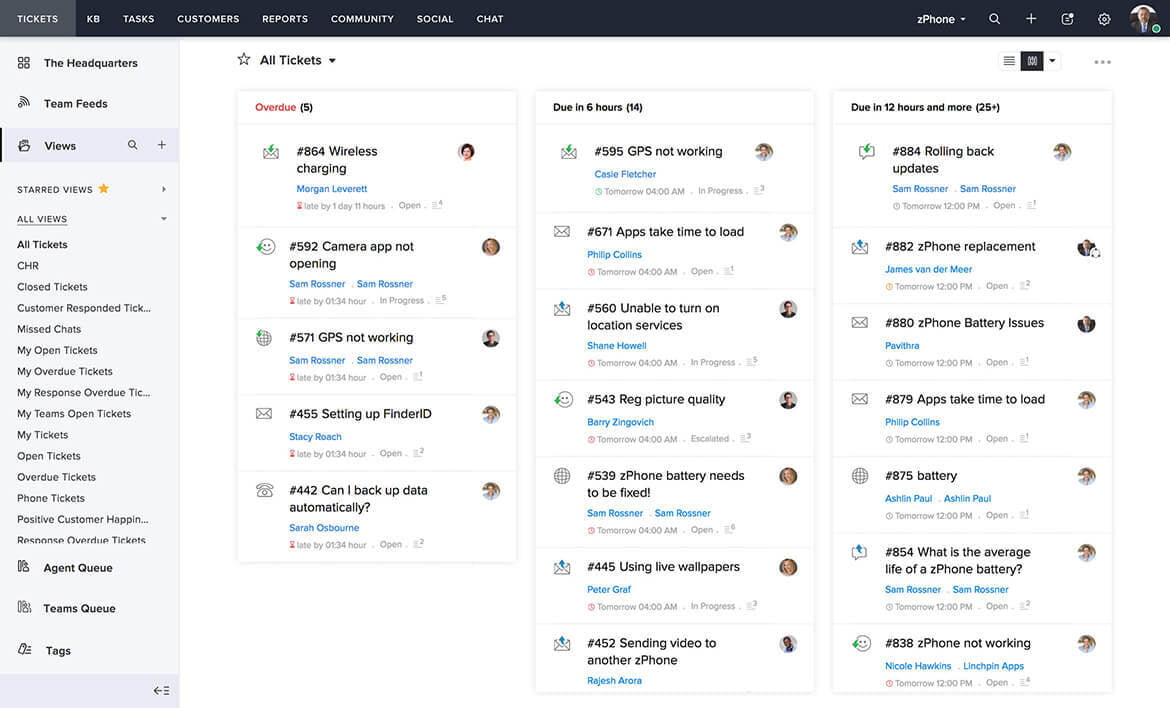
Standout Features:
- Electronic medical records to centralize patient data and improve visibility across care teams.
- Patient onboarding tools that simplify registration, reduce paperwork, and minimize errors to enhance the overall patient experience.
- Comprehensive appointment scheduling optimized for multi-clinic coordination.
- Customizable consent forms to support compliance and streamline patient authorizations.
- Efficient interdepartmental referrals to improve communication between departments and care providers.
- EHR and HIMS integration to synchronize clinical and administrative systems.
Pricing:
Zoho CRM pricing starts at $20 per user/month, with plans for healthcare organizations typically beginning around $50 per user/month to access advanced capabilities such as AI insights, territory management, and custom automation functions.
See also: Top 10 Zoho CRM Alternatives and Competitors
Salesforce
Best for: Healthcare organizations focusing on patient engagement and care coordination.
Salesforce CRM is a comprehensive customer relationship management platform that helps organizations manage and improve interactions with patients, members, and partners. In the healthcare sector, it unifies clinical and non-clinical data to provide a 360° view of each patient, offering actionable insights that enable care teams to deliver more personalized and coordinated experiences. The platform also integrates with EHR systems, specialized apps, and external data sources to enhance care delivery and streamline communication across multiple touchpoints.
To extend its healthcare functionality and AI capabilities, Salesforce offers Health Cloud — a specialized module built on top of the core CRM. Health Cloud automates key business processes, connects care teams through a single shared view, and improves collaboration between clinical, insurance, and administrative staff. The platform also integrates with Agentforce 1 — a specific add-on of Salesforce's AI features that provides predictive insights, personalized recommendations, and intelligent segmentation to support data-driven decisions.
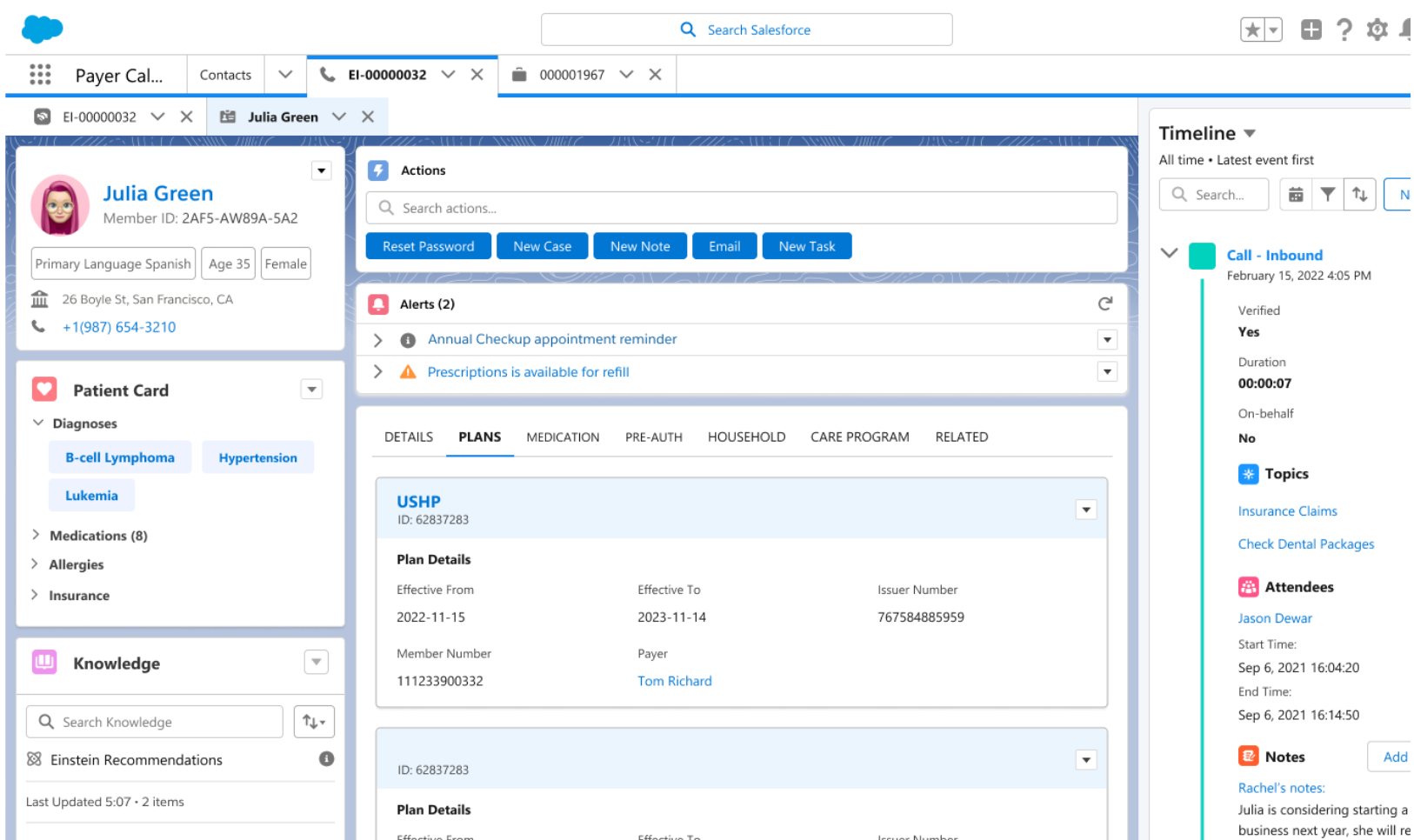
Standout Features:
- 360° patient management to unify patient data and enable personalized, continuous care.
- Dynamic email marketing to engage patients and members with targeted, automated campaigns.
- Process automation with Flows to streamline operations and improve productivity.
- Custom fields, apps, and objects for flexible configuration across departments.
- Clinical and insurance data models to enhance interoperability and data consistency.
- Predictive and generative AI through Salesforce Einstein for smarter insights and automation.
Note: Some features require additional licenses for Salesforce Health Cloud and Agentforce 1 to access specialized healthcare and AI capabilities.
Pricing:
The enterprise edition of Salesforce CRM pricing starts at $100 per user/month, while specialized industry solutions such as Health Cloud range from $350 to $750 per user/month, depending on deployment scale and integrated AI capabilities.
See also: Salesforce Alternatives & Competitors and Salesforce Marketing Cloud Alternatives & Competitors
HubSpot
Best for: Healthcare institutions seeking a multi-component CRM to enhance patient satisfaction and streamline communication.
HubSpot is an all-in-one platform that combines marketing, sales, service, data, and content management tools within a single CRM interface. While not designed exclusively for healthcare, it offers customizable features that help clinics, private practices, and healthcare organizations manage patient information, promote engagement, and automate patient-facing and internal workflows.
The platform’s intuitive interface and modular structure make it a good fit for organizations looking to digitize their outreach and improve patient engagement without extensive technical expertise. HubSpot’s automation tools help healthcare providers accelerate routine tasks such as creating personalized email campaigns, scheduling reminders, and managing inbound inquiries. Its easy-to-navigate reporting dashboards provide visibility into patient acquisition, satisfaction, and retention, supporting data-driven decision-making across medical teams.
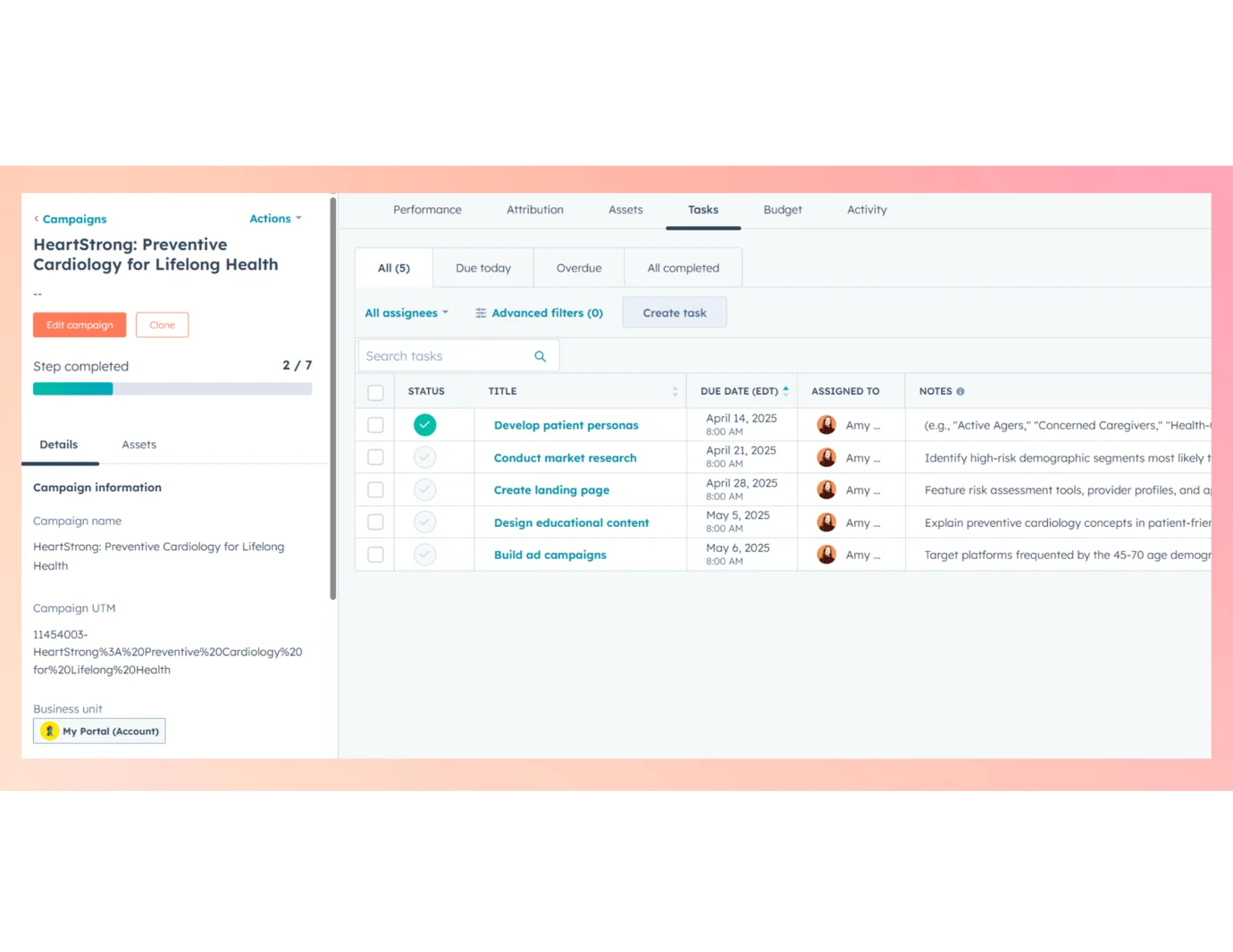
Standout Features:
- Teams functionality to organize CRM users by region, department, or business unit and assign marketing assets or database records accordingly.
- Custom reporting tools to analyze patient data and track performance metrics in a centralized dashboard.
- Calculated fields to automatically process key values such as commissions, billing summaries, or departmental KPIs.
- Configurable layouts to align CRM data presentation with team-specific needs and workflows.
- Built-in AI features to identify and merge duplicate records and automate repetitive administrative tasks.
Pricing:
Healthcare organizations typically consider HubSpot’s Professional or Enterprise plans, which start between $50–$75 per user/month, providing access to advanced customization, automation, analytics, and service management tools.
See also: Top 10 HubSpot Alternatives & Competitors
How to Choose the Best Healthcare CRM Software
Choosing the right healthcare CRM starts with exploring your organization’s goals and matching them with a solution that improves efficiency, compliance, and patient care. Here are the key steps to guide the process:
1. Define Your Goals & Key CRM Capabilities
Clarify what you want to achieve with a CRM — and what features are the must-haves for your healthcare solution. Outlining your expectations and needs first will help you focus on platforms that truly deliver value for your business.
Also, keep in mind the essential capabilities that your CRM should provide, all driven to the real processes (i.e., appointment scheduling, patient portal, patient communication) – as this will help you filter out the vendors that can meet your needs
2. Research CRM Vendors and User Feedback
Create a shortlist of leading healthcare CRM vendors and review user feedback on platforms like G2 or Capterra. Real-world insights from other healthcare organizations can help you evaluate reliability, support quality, and overall user satisfaction. Evaluate their capabilities: compliance, usability, and feedback
3. Evaluate Core Capabilities
Assess the strengths of each healthcare CRM solution in critical areas such as system integration (EHRs, billing, and communication tools), regulatory compliance (HIPAA, GDPR), data security, scalability, and customization. Consider the platform’s AI and automation capabilities, as they can significantly improve efficiency by streamlining repetitive workflows and providing real-time insights for better decision-making. Make sure the CRM aligns with your technical infrastructure and growth strategy.
4. Compare Pricing and Total Cost of Ownership
Beyond subscription fees, evaluate the total cost of ownership for each CRM vendor. Consider expenses for implementation, training, customization, and ongoing maintenance to ensure the healthcare CRM solution provides long-term ROI and doesn’t come with hidden costs.
5. Request a Demo and Plan for Adoption
Schedule live demos with the shortlisted vendors to see how each CRM performs in real healthcare workflows. Involve your internal teams during the demo stage and plan ahead for onboarding, user training, and adoption to ensure a smooth transition and maximize long-term value from the selected platform.
Summary
Choosing the right healthcare CRM is a long-term investment in better patient outcomes, operational efficiency, and sustainable growth. The right platform empowers healthcare organizations to automate complex workflows, manage patient relationships more intelligently, and deliver personalized care at scale. When evaluating your options, look for CRM solutions that align with both industry regulations and your organization’s unique processes — enabling seamless collaboration and data-driven care delivery.
At Creatio, we understand the specific challenges healthcare institutions face in balancing compliance, efficiency, and patient experience. Our healthcare CRM offers a composable, no-code platform with agentic AI capabilities to help you automate operations, coordinate care more effectively, and build strong patient relationships at any stage of their journey.





















































